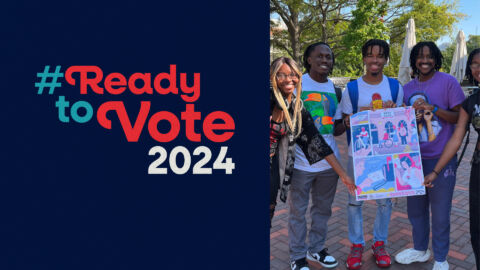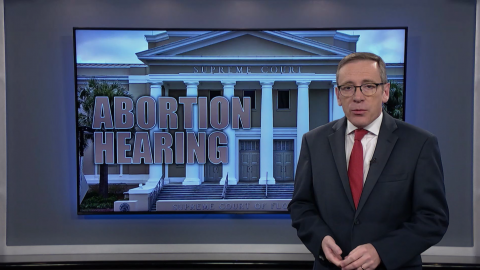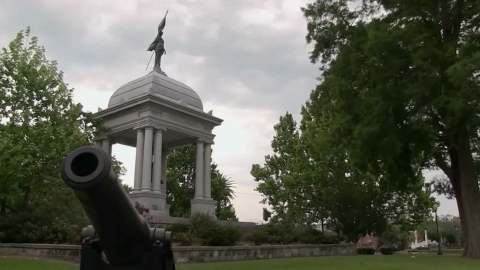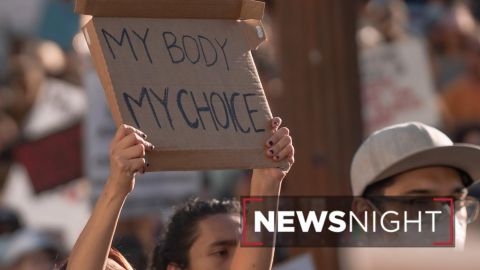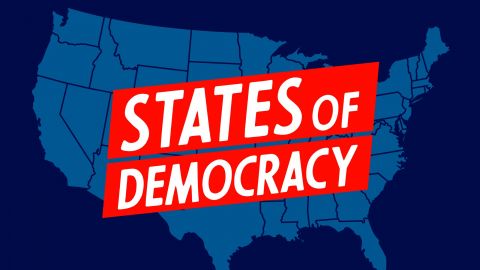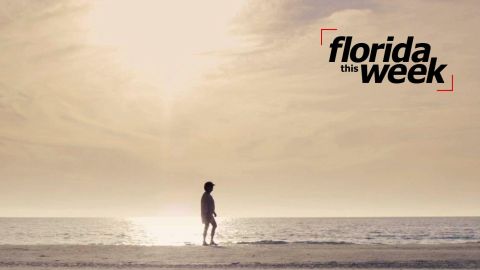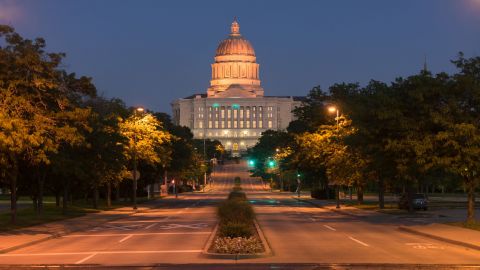>>This week on NewsNight, a look at U.S. Supreme Court decisions on redistricting in Alabama and Louisiana and what they might mean for Florida.
Plus, the panel discusses new protections in Florida for human trafficking survivors.
NewsNight starts now.
[MUSIC] Hello, I'm Steve Mort, and welcome to NewsNight where we take an in-depth look at the top stories and issues in central Florida and how they affect all of us.
First tonight, key rulings from the U.S. Supreme Court.
The high court closed out its term last week with some critical decisions.
The justices struck down President Biden's student loan forgiveness plan and rejected the legal theory that would have given state legislatures almost unchecked power over how federal elections are run in their states.
Meanwhile, the court made significant decisions on redistricting in two Southern states.
Ruling Alabama's district boundaries violate the Voting Rights Act, with just one majority black seat out of seven in the state.
That ruling could also lead to a redraw of Louisiana's congressional map to add a second black access district there.
Now, according to reporting in the Orlando Sentinel, plaintiffs hope their court challenges to Florida's redrawn 2022 congressional map may go the same way.
Last year, the Florida legislature passed new electoral maps after a bitter fight in Tallahassee.
In the end, lawmakers passed a congressional map drawn up by the governor's office, which opponents say disenfranchize black voters and cut the number of likely seats for Democrats.
In North Florida, the 2022 map eliminated a black access district connecting communities between Jacksonville and Tallahassee.
Governor DeSantis described the now eliminated district as a racial gerrymander.
In central Florida, Democrats previously held three congressional districts, but after the redraw, they now hold only two.
Mone Holder is the senior director of advocacy programs with the racial justice organization Florida Rising.
>>We are obviously very excited to hear the Supreme Court's ruling because that's considered a win not just for Alabama, but for all of the states in being in, I would say, partnership or in conversations with other organizations, especially the ones leading the Allen v. Milligan case, we knew how hard it was to push through in community, as well as pushed through in the courts to get a favorable decision.
What we've seen increasingly is there's more attacks to having black representation across the state.
So hearing that decision is what we call like a gift or win.
And we've already started to see subsequent legal victories for other grassroots organizations like in Louisiana and North Carolina.
So it's a silver lining and hopefully something that will trickle down when the Supreme Court hears cases as it relates to Florida.
It really just shows that black voters are under assault in these states.
I want it to be clear, like redistricting is designed in itself to be a fair process, but it often is not.
And it disenfranchises black voters and black representation.
Its an opportunity for us not only to say here he's - help to get the correct numbers of census was also an effort that Florida Rising took up to make sure that folks are actually counted because that's a thing, right?
How do we communicate that this is happening?
What would it what's at stake, whether it's, you know, more resources for your neighborhood or fair representation?
So that's one.
But, you know, usually these things end up in litigation and in the courts because it's not a fair process.
The will of the people is not taken into consideration.
And we know, like, for example, in Florida, we have a strong tool for protecting voters, which is the Fair District amendments, which help to protect black voters from legislators or governors who want to take their voice away.
But unfortunately, when the constitution of the state is not upheld, we have to meet them in court.
And that's what's been happening, and that's what will continue to happen until they get it right.
>>Mone Holder there.
Well, let's bring in our panel now to break it all down.
And joining us in the studio this week, Steven Lemongello covers politics for the Orlando Sentinel.
Thanks so much for coming in, Steve really appreciate it.
Karla Ray, investigative reporter over at Channel 9.
Thanks for coming in, Karla.
>>Thank you for having me.
>>Thanks for your time.
And Talia Blake, she covers the economy, is also the morning host at 90.7 WMFE News.
Thanks so much for coming in, Talia.
Thanks, guys.
Really appreciate it.
Steve, let me start with you on this one.
What was the basis for the US Supreme Court's decisions on Alabama and Louisiana?
>>Yeah, they ruled that it violated the 1965 Voting Rights Act.
They say that there's enough black voters in Alabama to fill two congressional districts or be majorities in two congressional districts, but all of them are just squeezed into one.
And they said that was a racial gerrymander.
>>I mean, there were two suits now, right, against Florida's congressional map, one in state court, I believe, and one in federal court.
Who are the plaintiffs in those cases and how do they differ from the cases in the other two states?
>>Yeah.
So the state's lawsuit is by League of Women Voters and a bunch of other groups are the same ones who were successful ten years ago and got the maps rewritten then.
They're going their lawsuit is based on the Fair Districts amendment to the Florida Constitution, which was in term based on the Voting Rights Act itself.
So it's not it's sort of by way of the Voting Rights Act, by way of the Florida Constitution.
>>Right.
>>The other one in federal court is by Florida rid - Florida Rising and a bunch of other groups as well.
>>We had just heard from just there.
>>Yes, theirs is based on the 14th and 15th Amendments, the sections about racial discrimination.
They're arguing that these DeSantis maps are essentially just overtly anti-black and, you know, racially biased and therefore they should be overturned.
So they're technically arguing on to two different things.
>>Yeah.
And it's interesting, isn't it, that that the 14th Amendment to the US Constitution is interpreted quite differently on the two sides.
>>Right.
As he just mentioned, they're arguing that this is, you know, discriminating against one racial group by the argument by Governor Ron DeSantis, his team, to want to eliminate that district.
But the governor is saying because this was drawn inherently for one race of people, that it discriminates against others.
>>Steve, if Florida's map has got to be redrawn again, could it have an impact on the makeup of Congress in a close election?
>>Oh, yeah.
Florida essentially got four new Republican districts out of this.
And basically Republicans hold Congress now by, I think, four seats after a fifth one resigned suddenly.
So, yeah, basically this, you know, alone could if Democrats, you know, were able to win back those four seats and a new map could essentially, you know, tie the House of Representatives.
And then, of course, you see the map happening in Alabama and Louisiana and a bunch of other states.
New York apparently might be allowed to gerrymander for Democrats if they want to, in the case of their Democrats, could easily win back the House next year.
>>Because all these arguments change depending on who's in power and who's appointing justices to to different courts.
Talia, there was another key election ruling by the US Supreme Court last week where the justices rejected the so-called independent state legislature theory.
What does that theory suggest?
>>Right.
So that theory would basically give states kind of unchecked power to pass election laws.
It would give states basically wider authority to gerrymander maps to pass election or pass voter suppression laws.
It would give them ultimate power in that sense.
>>In that ruling, I mean, the justices cited the Bush v Gore case, which they don't do very often-- >>Because the Bush Gore case specifically said do not you know, this is not a road map for you to follow, do not follow the thing.
>>It was basically they sort of said that was going to be like a one off rule initially.
I mean, that that settle that 2000 presidential contest in Florida.
But but some liberals are concerned about that now.
>>Yeah.
Essentially, John Roberts said like, okay, the Bush versus Gore is a one off, but we are allowed to also do other one offs and just sort of insert ourselves into various states, you know, lawsuits over over gerrymandering when we feel there is reason to do so.
So essentially giving the Supreme Court the ability to sort of parachute in and just sort of suddenly, you know, make rulings on various, you know, maps.
>>Karla, before we move on, I want to mention another important US Supreme Court ruling barring the use of affirmative action in college admissions.
This was a big one that got a lot of coverage.
Florida actually banned that, I think, in 2009.
But could that ruling bolster some of the governor's higher education reform efforts here in the state, do you think?
>>I think we're already seeing that sort of posturing from DeSantis and his his team of, you know, this is another example of “stop woke ” in action in Florida leading the way, so to speak, in sort of doing away with affirmative action years ago.
I think it'll certainly be a talking point for him as we approach the presidential election, as he continues his campaign.
>>And we're certainly seeing that the fallout, right.
And we talked about this briefly on the show last week from some of these measures.
When it comes to higher education institutions and what they're experiencing.
>>Oh, yeah.
I mean, if you just look at DEI right now, diversity, equity and inclusion, when those bills passed on or when those laws went into effect on July 1st, states, colleges and universities no longer were allowed to use funding towards DEI.
And if you look at what's happening at New College of Florida, you can see all of those efforts just going in the opposite direction.
Now, you know, a lot of times DEI offices were there so that you could facilitate having a diverse faculty and a diverse staff that represents everybody in your community.
Now, schools are going to be struggling with that, and we're already seeing them struggle with that, struggling to hire positions for DEI offices or even close to that.
Nobody wants to take those positions now.
>>Well, be sure to join this conversation on social media.
We are at WUCFTV, on Facebook, Twitter and Instagram.
We'd love to hear what you have to say about these important issues.
All right.
Next tonight, the scourge of human trafficking and efforts to tackle it in Florida.
Back in May, Governor DeSantis signed several pieces of legislation, some of which are now just coming into force aimed at strengthening protections for human trafficking survivors in our state.
Figures show sex trafficking accounts for the majority of cases here with hotels and motels, the most likely venues.
Well, Karla has been covering this issue extensively for WFTV, Channel 9, and she filed this report when the governor signed Florida's new legislation.
>>9 Investigates exposed hotels and motels in Florida that had been cited for failing to train staff to spot the signs of human trafficking more than 15,000 times.
But of those violations, none had ever been fined.
Even repeat offenders.
>>No, no fines because they have 90 days to correct whatever is wrong.
And that's just like an unlimited pass.
>>Survivor Savannah Parvu told us about being trafficked from a repeat offender hotel in central Florida as a child.
Today, she stood next to Governor Ron DeSantis as he signed a law reducing the amount of time from 90 to 45 days that those facilities have to come into compliance.
If they're found not training their employees with any subsequent violation, resulting in a fine of $2,000 per day.
>>So I think that will be something that will really, really light a fire and will make sure that these establishments are taking this responsibility more seriously.
>>It's just one part of several pieces of legislation the governor signed aimed at addressing human trafficking, including creating certification and regulation standards for safe houses.
>>Safe houses need to have appropriate tools in place to meet the moment.
>>That change comes after 9 Investigates exposed complaints about a central Florida safe house, making Florida the first state to regulate those facilities.
>>Because of your reporting, there was really just a more of an an awareness of the need for that oversight of adult safe homes.
>>Tomas Lares there.
Okay, Karla, let's break all this down.
Nice piece by the way.
There are quite a few different elements to the recent pieces of legislation that were signed by the governor.
What are the headlines in terms of the changes?
>>Yes.
So the big ones you just heard about the hotels requiring the training to be done for their employees.
Now, that was put in place a few years back.
But as we uncovered in that piece, there were violations over and over and over.
So now it immediately upon a subsequent violation, they will start accruing those fines.
So hopefully that will encourage hotels to make this a priority.
Also, there's new legislation in place where victims can now seek civil damages against their traffickers, as well as entertainment venues that aid in trafficking.
And the big one, I think, that we're going to see play out over the next year or so is this move toward certification and standardization, regulation of adult safe homes, which was kind of a Wild West situation here in Florida and really across the country prior to this legislation being passed.
>>And one of those things that you mentioned there in your piece was safe houses for adults.
I mean, first of all, what are those facilities for people that might not know?
And what are the measures that are now in place?
>>Yes.
So there are 13 known safe houses, according to a DCF analysis, prior to this legislation being passed across the state of Florida.
Several of them are here in central Florida.
We have the Lifeboat project, a big one Samaritan village here in central Florida.
And these are safe homes like what you would think of for maybe a domestic violence victim.
But they are geared toward human trafficking survivors.
And so that subset of the population has a very specific set of trauma that they've been through specific needs.
And what we found in our reporting was that prior to this, there were no standards and nobody doing inspections on the state level to ensure that these these survivors were getting the care that they need.
>>Almost amazing that that, you know, there was no-- >>The lack of oversight.
>>No safety net in place there.
>>But if you think about it in terms of the, you know, the history of of safe houses or halfway houses, this is a relatively new issue that people have latched on to in the last ten or 15 years.
Ten years ago, MBI was still going out and arresting people for prostitution.
We're no longer seeing that really in our community.
It's it's turned to a victim focus.
And so I think that we're just now catching up here in Florida.
And with these new standards, Florida will lead the way in the country.
We're the first state to regulate this.
>>I mean, Tomas Lares we heard that from United abolitionists.
I mean, he credited your reporting for kind of spurring some of that change.
>>Yeah, we had several survivors come to us at the beginning of the year with complaints about a specific safe house here in central Florida where they felt like they were re-exploited, that the conditions weren't all they were cracked up to be.
And, you know, this is these are facilities that get a lot of grants from from public funding.
They get a lot of donations from from high level donors in the community.
And when we sat down with the executive director, even, she admitted, you know, there is no oversight and she she welcomed it.
So I think we're going to see, you know, the sort of safe houses transformed over the next year as they work toward certification.
>>Yeah, hopefully.
I mean, Steve, the lodging industry.
Let's talk about those guys.
I mean, the lodging industry has been accused of sort of trying to avoid responsibility on this issue.
Some advocates have said that this sort of legislation, this draft of legislation doesn't go far enough in allowing survivors to recover damages.
I mean, how so?
>>Yeah, there's been a lot of criticism that fines really aren't being levied here.
So there was there have been attempts to get to allow victims to sue hotels and motels and that that was in various drafts that, you know, made their way through the legislature.
But, you know, the latest latest one doesn't include that.
Of course, you know, the hotels and motel industry is very powerful here in Florida, central Florida in particular, obviously saw what happened with the discussion of hotel taxes.
Like, okay, so we use these hotel taxes for something other than expanding the convention center to be the size of Las Vegas.
And of course, it never happens.
So essentially, for a lot for basically in central Florida at least, and Florida in general, you know what the hotels, motels wants, you know, they get.
>>Is that something that you hear from the human trafficking advocates that the hotel and lodging industry is is something of a stumbling block?
>>Yeah, absolutely.
And Savannah, the survivor that we interviewed for that story.
Yes, she went to Tallahassee along with an attorney from here in town who represents a lot of human trafficking survivors.
And they they spoke to the committee there about, you know, keeping that civil litigation piece in in legislation in the future.
It was ultimately removed as Steve, as Steve mentioned, because there is a large lobbying effort against that kind of accountability.
But they can sue in federal court.
They can seek those damages in federal court.
But in state court, they cannot.
>>Yeah.
>>Yeah.
And even the governor has come out, I mean, in his continued back and forth with Disney and pointing the finger at those lobbying efforts on behalf of our large tourism industry as being the block to, to this type of legislation.
>>Yeah, certainly the DeSantis administration, Talia, has been pretty involved in this issue.
The Attorney general, Ashley Moody, has been outspoken in her campaign against human trafficking.
I mean, give us a sense of where Florida sits nationally in terms of the number of human trafficking cases and which sectors seem to fuel it.
Oh, yeah, we are up there.
We're we're in the top three of a race.
We don't really want to be winning right now.
So we're third in the nation, according to the human trafficking hotline just behind California and Texas.
And I want to say they reported it in 2021, some 700, almost 800 cases just in that year.
And when you think sector is fueling it, just like you mentioned, with hotels and motels, think hospitality hotels and motels can kind of fall underneath that.
Then kind of those spas, massage kind of industry type businesses and then obviously, but not obviously sex work as well.
>>Yeah, and agriculture industry I've had is also one of the reasons we have large numbers.
>>Right.
That would be more human trafficking, labor trafficking versus the sex trafficking that I think we all think of when we hear human trafficking, particularly here in central Florida.
And the one good part about being third on that list, that list is compiled based on the number of calls to the hotline, the human trafficking hotline.
So that means that people in Florida are recognizing it.
It doesn't mean that it's not happening in other states.
Maybe the campaign of awareness has worked here over the last few years to increase those calls, and hopefully that will level off as these efforts move forward.
>>I mean, human trafficking advocates that I've talked to have always said that we think that it's an undercount.
I mean, why has it been so hard to kind of get an accurate count about the scale of the problem?
>>Yeah, well, there's no statewide database or there was no statewide database right now, after that human trafficking bill that Governor DeSantis signed in that bill, he basically designated UCF as the official state storehouse.
So what UCF, or not UCF, USF, the University of Southern Florida, St. Pete Campus in particular.
What they're going to be doing is looking at all of the data from all the agencies, because right now every agency stores their own data.
So the police might have different data than advocates might have different data than an organization trying to help you get back on your feet.
So right now, the USF is going to take all that data and compile it into one big place that everyone can come look for, for resources.
>>And hopefully, hopefully that'll lead to some solutions to what seems to be an intractable problem in our state.
You can find a link to the National Human Trafficking Hotline, Statistics for Florida, Karlas reporting on the issue as well, as well as links to resources and organizations aimed at combating human trafficking.
It's all on our website, wucf.org/newsnight.
Well, finally tonight, we wanted to update you on developments in a fight between Disney and Governor DeSantis.
Since we last talked about the issue, there have been several important legal and political developments to follow up on.
So I wanted to do that a little bit today.
And Steve, let me start with you on this.
I mean, the Sentinel has been covering several developments in Disney's ongoing legal fight with the governor and the new Central Florida Tourism Oversight Board.
What's the state of play there?
>>Yes, the main thing here seems to be that DeSantis does not want this ongoing thing happening during the presidential campaign.
Disney has sort of said, hinted that they'd be willing to, you know, have some sort of arbitration and DeSantis, that would start late this year.
DeSantis has basically rejected that.
They also put forward conflicting dates of when they want this trial to start.
Disney wants this trial to start in July of 2024, which would be just during the Republican convention.
And DeSantis saying he wants it to start in August 2025, which would be like, you know, six months after a new president is sworn in or re sworn in.
>>Yeah.
So there may be some political calculations there.
Talia I mean, Disney, in fact, just beat up back a lawsuit from one of its investors rights over its opposition to that Parental Rights in Education law.
>>Yeah.
In Delaware.
So one of their shareholders was suing saying that Disney basically acted negligent and they let their personal views impact what they said about the “Don't Say Gay ” law.
Delaware judge said they didn't act negligent.
That's not happening.
And the shareholder was also requesting all of the board members emails for like the past couple of years to prove that they acted negligent.
But the judge basically decided that they didn't and that-- >>It was a business decision, right?
>>Yeah, it was a business decision that their personal views didn't impact what they had to say about the law.
>>Yeah, I mean Karla this seems to be tensions now between the DeSantis picked board and the firefighters who sort of backed that shake up last year quite strongly.
I think that they favor the governor's plans.
Channel fi - Channel 9 has been covering that.
What do we know?
>>It seems like we were almost getting somewhere with with the firefighters.
They have been asking for a new contract, I think for for going on five years now, saying that they don't have enough staff to cover, you know, what's a growing district.
And we were reporting that the contract was was right there.
It was a done deal.
And then the new board brought in this new administrator who suddenly pulled the rug out from underneath the firefighters, it seems, and said that the negotiations are ongoing.
So we still don't know exactly where the contract stands.
We've reached out to the firefighters union and have not gotten a response on that, but it seems to have alienated the firefighters.
And it was almost like, you know, DeSantis had an ally there that he may not have anymore.
>>Gilzean the new administrator.
Your colleague, Steve, Desiree Stennett in fact did a piece this week about how the Urban League is now sort of trying to move on, having lost its leader.
Steve, with Governor DeSantis now running for president, right.
I mean, he's really leaning in to this battle with Disney.
He's accused the company recently, I think, quote, of trying to rob our children of their innocence.
How is Disney likely to respond to kind of continuing culture war attacks like this?
I mean, throughout this campaign, it's going to be pretty sustained.
>>Yes, it's essentially not an applause line but a boo line in his, you know, stops around the country.
So the other day at the Moms for Liberty in Philadelphia, he mentioned like, oh, a certain company in central Florida.
And of course, that went to the boos.
You know, he and others have basically sort of cited a conservative, you know, video, sort of like, you know, Disney executives talk about, you know, putting some trying to get some gay themes in their movie and things like that as sort of like proof that like you quoted, they're insidiously trying to ruin kids innocence or something like that.
But in theory, it's in practice, it's basically been like, you know, a character in one movie, as you know, mentions her girlfriend in like, you know, two characters, you know, two woman characters hug in the background or something like that.
There's really been no major, you know, you know, LGBTQ character and like a lot of Disney movies.
So it's sort of been, you know, some would say that's been overplayed.
>>Yeah Karla I wanted to ask you about something that Channel 9 has covered, and this was after the company shelved its plans for Lake Nona campus.
And what might happen to that land now, Is Disney going to have to sell that back?
>>So Tavistock put in its contract to Tavistock, the developer of Lake Nona, put in a contract with Disney, possibly in anticipation of the political climate.
Who knows that they would have to meet certain thresholds by a certain date or they have to sell it back.
So the thresholds by 2028, Disney would have to develop at least 250,000 square feet of interior building area by that time, and then 500,000 square feet of building area by 2031.
Unclear whether Disney will actually use that land.
They may sit on it a while and then sell it back to Tavistock.
But certainly something to watch out there as Lake Nona continues to develop.
>>And of course, it's unclear whether or not that decision not to do the Lake Nona development had to do with that conflict with the governor's office.
Governor's office obviously pushes back against that.
I mean, despite all of this, Talia, Disney doesn't really seem to be backing down right in.
It's in its sort of public facing support for the LGBTQ community.
>>No, they still put on their gay days tradition, which has been going on for a decade.
And they were actually encouraging people to come like, don't be afraid, just come on over.
And then they're still hosting.
Every year they host this huge LGBTQ conference and they're doing it in September right here in Orlando.
And they don't always do it in Orlando.
Every single year they kind of move around the country.
But I feel like the fact that they're coming back to Orlando for their big conference is kind of like a “And so what?
We do what we want to do and we stand up for who we want to stand up for.
” >>May be sending a message for sure.
Well we'll keep following all the developments as it pertains to Disney.
A really important story for central Florida and our economy.
Just a reminder, you can find much more from the NewsNight team on our website.
We're always online at wucf.org/newsnight along the bottom of your screen.
That is all the time we have for this week.
My thanks to Steve Lemongello from the Orlando Sentinel, Karla Ray from WFTV, Channel 9, and Talia Blake 90.7 WMFE News.
Thanks so much for coming into today, guys.
Really appreciate your time.
>>Thank you.
>>In the meantime, we'll see you next Friday night here at 8:30 on WUCF from all of us here at NewsNight.
Take care and have a great week.

